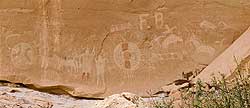SIA2217: Historic Ute Petroglyph Panel

|
|
Download Options
| Image Name | Width x Height | Size |
|---|---|---|
| SIA2217.jpg | 800 x 309 | 64K |
| SIA2217.jpg | 1500 x 579 | 166K |
| SIA2217.jpg | 4000 x 1545 | 1010K |
| SIA2217.jpg | 6307 x 2436 | 4M |
Caption
The Historic Ute rock art is identified and dated by the horse and rider figures. Horses were introduced to North America by the Spanish in the sixteenth century. Other figures, or elements, painted in red and white on the panel include a white bison, a human figure with leggings, several large human figures, and large circles believed to be shields. The Ute people practiced a hunting and gathering lifeway. They used the bow and arrow, and made baskets and brownware pottery, and lived in brush wikiups and tipis. The No-tah (Ute people) lived freely throughout western Colorado and eastern Utah until about 1880, when they were forced onto reservations.
Copyright © 2005-2009 Calvin & Rosanna Hamilton. All rights reserved.